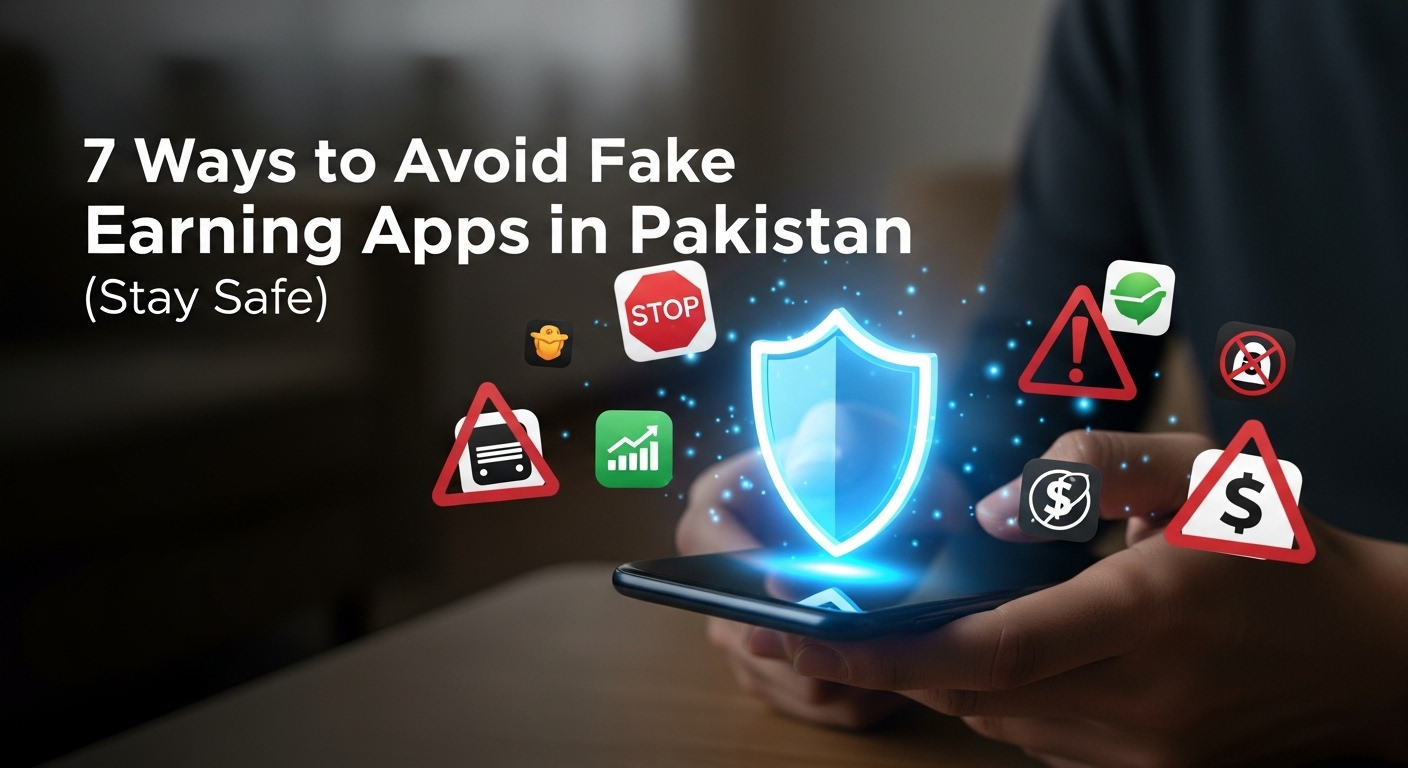In Pakistan, many people are looking for ways to earn online, but unfortunately, the digital landscape is also full of fake earning apps and scams. This guide will help you understand how to identify and avoid these fraudulent schemes, ensuring your financial safety and peace of mind.
What are fake earning apps, and how do they work in Pakistan?
Fake earning apps are deceptive mobile applications or websites that promise users high returns for minimal effort, often through tasks like watching videos, clicking ads, or investing small amounts. In Pakistan, they typically operate by luring individuals with unrealistic promises, collecting initial investments or personal data, and then disappearing or making it impossible to withdraw funds.
Why are fake earning apps so prevalent in Pakistan?
The prevalence of fake earning apps in Pakistan can be attributed to several factors, including a high unemployment rate, limited traditional job opportunities, and a growing interest in online income streams. Scammers exploit the hope and financial vulnerability of individuals, coupled with a lack of digital literacy and awareness about online fraud.
Understanding the Lure: Too Good to be True
Many fake earning apps in Pakistan promise exorbitant returns in a short period. They often use enticing language like “earn Rs. 5,000 daily with just 30 minutes of work” or “double your investment in a week.” Such claims are immediate red flags, as legitimate opportunities rarely offer such easy and massive profits.
These apps capitalize on the desire for quick money, especially among those facing financial hardship or seeking supplementary income. They might use flashy interfaces and fake testimonials to build a facade of credibility.
The Modus Operandi: How Scams Unfold
Typically, these apps follow a predictable pattern. First, they attract users through social media ads, WhatsApp groups, or influencer promotions. Then, they might require a small “registration fee” or an initial “investment” to unlock earning potential.
Users might initially see some small, fake earnings reflected in their app balance, which encourages them to invest more or recruit others. When it’s time to withdraw significant amounts, the app either freezes, demands more fees (taxes, processing fees), or simply vanishes, leaving users empty-handed.
How can I research an online earning app’s legitimacy before investing?
Thorough research is your first and most crucial defense. Start by searching for the app’s name along with terms like “scam,” “reviews,” “fraud,” or “legit.” Look beyond initial positive comments, which are often fabricated.
Check reputable tech blogs, consumer protection forums, and official government advisories. Be wary if you find numerous complaints about non-payment, withdrawal issues, or a lack of transparent business practices.
Step 1: Deep Dive into Online Reviews and Forums
When you encounter an earning app, the first thing to do is search for its name on Google, YouTube, and social media platforms like Facebook and Twitter (now X). Pay close attention to user reviews and discussions.
- What to Look For:
- Look for genuine, detailed reviews, not just generic positive comments.
- Prioritize reviews that mention specific experiences with withdrawals or support.
- Be cautious of overwhelmingly positive reviews that sound too similar or lack specifics.
- Why it Matters:
- Real user experiences are often the best indicator of an app’s reliability.
- Scammers often create fake reviews to mislead potential victims.
- How to Do It:
- Search “App Name + review,” “App Name + scam,” “App Name + withdrawal issues Pakistan.”
- Check Pakistani tech forums and Facebook groups where people discuss online earning.
Step 2: Verify the App’s Website and Contact Information
A legitimate app will have a professional website with clear contact details. Scam apps often have poorly designed websites or lack proper contact information.
- What to Look For:
- Does the app have an official website?
- Is there a physical address, email address, and phone number for customer support?
- Are the terms and conditions, and privacy policy clearly stated and easily accessible?
- Why it Matters:
- Legitimate businesses operate transparently and provide multiple channels for customer support.
- Lack of verifiable contact information is a huge red flag, indicating they don’t want to be traced.
- How to Do It:
- Visit the app’s official website. Look for “Contact Us,” “About Us,” “Terms of Service,” and “Privacy Policy” pages.
- Try sending an email to their support address to see if you get a response.
What are the red flags to look out for in suspicious earning apps?
Several key indicators suggest an earning app might be a scam. Be highly suspicious if an app:
- Demands upfront fees for registration, membership, or “unlocking” earnings.
- Promises extremely high, guaranteed returns with little to no effort or skill.
- Uses vague language about how money is generated.
- Requires you to recruit new members to earn significantly (pyramid scheme).
- Has poor grammar, spelling, or unprofessional design.
- Pressures you into quick decisions or large investments.
- Lacks a presence on official app stores or has very low ratings/many negative reviews on them.
Red Flag 1: Unrealistic Promises and Guaranteed Returns
No legitimate investment or earning opportunity can guarantee high returns without risk. If an app promises daily profits of 10-20% or claims you’ll become rich overnight, it’s almost certainly a scam.
- What to Look For:
- Any claim of “guaranteed income” or “risk-free high returns.”
- Promises of earning thousands of rupees for simple tasks like clicking buttons or watching short videos.
- Why it Matters:
- These promises are designed to appeal to desperation and bypass logical thinking.
- Real earning requires effort, skill, and carries inherent risks.
Red Flag 2: Upfront Fees or Mandatory Investments
Legitimate earning apps or platforms do not ask for money to join or to start earning. If an app requires a “registration fee,” “membership fee,” “security deposit,” or insists on an initial “investment” to unlock higher earning tiers, consider it a major warning.
- What to Look For:
- Any request for payment before you can access or withdraw your supposed earnings.
- Pressure to invest more money to get bigger returns.
- Why it Matters:
- Scammers use these fees to collect money from unsuspecting users before disappearing.
- Genuine opportunities usually involve earning through your skills, time, or legitimate sales, not by paying to participate.
Red Flag 3: Lack of Transparency in Business Model
A legitimate earning app will clearly explain how it generates revenue and how users earn money. If the explanation is vague, uses jargon without clarity, or doesn’t make logical sense, be suspicious.
- What to Look For:
- Unclear explanations of their revenue stream.
- Ambiguous task descriptions (e.g., “social media promotion” without details).
- Why it Matters:
- Transparency builds trust and demonstrates a viable business.
- Scammers intentionally keep their methods opaque to hide their fraudulent activities.
Red Flag 4: Emphasis on Recruitment (Pyramid Scheme)
Many fake earning apps are thinly veiled pyramid schemes. They prioritize recruiting new members over any actual product or service sales. You only earn substantial amounts by bringing in more people who also invest.
- What to Look For:
- Earning potential heavily dependent on how many people you refer.
- “Multi-level marketing” or “network marketing” that doesn’t involve selling a tangible product.
- Why it Matters:
- Pyramid schemes are unsustainable and illegal. They collapse when new recruits dry up, leaving those at the bottom with losses.
Red Flag 5: Poor App Quality and Unprofessional Communication
Often, fake apps are hastily put together. Look for signs of unprofessionalism.
- What to Look For:
- Numerous spelling and grammatical errors within the app or on its website.
- Clunky user interface, frequent crashes, or unresponsiveness.
- Unprofessional customer support interactions or generic, automated responses.
- Why it Matters:
- Legitimate companies invest in high-quality development and professional communication.
How can I check if an online earning platform is registered?
For investment-related platforms, check with the Securities and Exchange Commission of Pakistan (SECP). For telecom-related services or general digital conduct, the Pakistan Telecommunication Authority (PTA) might issue advisories. H1owever, many smaller “earning apps” are not formal companies and thus not registered with these bodies, making it harder to track them. Always verify with the relevant regulatory body if they claim to be a registered financial entity.
Verifying with SECP and PTA
The Securities and Exchange Commission of Pakistan (SECP) regulates corporate sector, capital markets, and financial services. If an app claims to be an investment platform or a company, it should be registered with the SECP. You can check their official website for registered entities. Similarly, the Pakistan Telecommunication Authority (PTA) is responsible for telecommunication services; while they don’t regulate earning apps directly, they do issue warnings about scams that exploit digital communication channels.
- What to Do:
- Visit the SECP website and use their company search tool if the app claims to be a registered company or investment firm.
- Keep an eye on PTA press releases and consumer alerts regarding online fraud.
- Why it Matters:
- Registration with regulatory bodies indicates a level of legitimacy and oversight.
- Many fake apps operate outside any legal framework, making them difficult to hold accountable.
What legitimate online earning opportunities exist in Pakistan?
Legitimate online earning opportunities in Pakistan often involve freelancing, e-commerce, content creation, or online services. Examples include:
- Freelancing on platforms like Upwork, Fiverr, or Freelancer.pk for skills like writing, graphic design, web development, or digital marketing.
- Online tutoring or teaching.
- E-commerce through platforms like Daraz or by setting up your own online store.
- Content creation on YouTube or blogging with advertising revenue.
- Data entry or virtual assistant roles through reputable agencies.
Freelancing Platforms (Upwork, Fiverr, Freelancer)
These platforms connect skilled individuals with clients globally. You offer services like writing, graphic design, web development, virtual assistance, and digital marketing. Payments are usually secure and transparent.
The key here is that you’re selling a skill or service, not just clicking buttons for an unrealistic payout. Building a portfolio and client ratings takes time and effort.
E-commerce (Daraz, Social Media Shops)
Selling products online, either through established marketplaces like Daraz or by setting up your own shop on social media platforms (Facebook, Instagram), is a legitimate way to earn. This requires product sourcing, marketing, and customer service.
This is a real business venture, not a get-rich-quick scheme. Your income directly depends on your sales and business acumen.
Content Creation (YouTube, Blogging)
If you have a passion or expertise, you can create video content for YouTube or write articles for a blog. Income is generated through advertising, sponsorships, or affiliate marketing, but it takes consistent effort to build an audience.
This is a long-term strategy, and earning significant income takes time, dedication, and quality content.
How can I protect my personal data from fraudulent apps?
Never provide sensitive personal or financial information to an app unless you are absolutely certain of its legitimacy. This includes your CNIC number, bank account details, credit card numbers, or Easypaisa/JazzCash PINs. Be cautious about giving apps permissions to access your contacts, photos, or SMS messages, as this can be used for malicious purposes.
Always use strong, unique passwords for all your online accounts and enable two-factor authentication (2FA) wherever possible. This adds an extra layer of security, even if your password is compromised.
Be Cautious with Permissions
When you install an app, it often asks for various permissions. While some are necessary (e.g., camera for a photo editing app), be wary of earning apps that request excessive permissions like access to your contacts, SMS, call logs, or microphone.
- What to Do:
- Review app permissions carefully before installing.
- Deny unnecessary permissions if the app still functions.
- Why it Matters:
- Scammers can use these permissions to steal your data, send spam messages to your contacts, or even monitor your activity.
Never Share Sensitive Information
Legitimate earning apps will rarely ask for your bank account PIN, credit card CVV, or full CNIC details upfront. Be extremely cautious about sharing such information.
- What to Do:
- Only provide payment details through secure, encrypted channels if you’re making a purchase or withdrawing earnings from a verified, legitimate platform.
- Never share OTPs (One-Time Passwords) with anyone, even if they claim to be from the app’s support team or your bank.
- Why it Matters:
- Scammers use this information for identity theft and unauthorized transactions.
What should I do if I suspect I’ve been scammed by an earning app?
If you believe you have fallen victim to a fake earning app in Pakistan, act quickly:
- Stop all communication with the scammers and cease any further payments or investments.
- Report the app to the relevant app store (Google Play Store, Apple App Store) and explain why it’s fraudulent.
- File a complaint with the Federal Investigation Agency (FIA) Cyber Crime Wing in Pakistan. They are the primary authority for investigating cybercrimes. Provide all available evidence, such as screenshots, transaction IDs, and communication logs.
- Inform your bank or mobile wallet service (Easypaisa, JazzCash) if you made any financial transactions. They might be able to reverse payments in some cases, though this is often difficult.
- Warn others by posting your experience on social media and consumer forums, helping prevent more people from falling victim.
Reporting to Authorities: FIA Cyber Crime Wing
The Federal Investigation Agency (FIA) Cyber Crime Wing is the official body in Pakistan responsible for investigating cybercrimes, including online financial fraud.
- What to Do:
- Gather all evidence: screenshots of the app, transaction details (Easypaisa, JazzCash, bank transfers), chat logs, website URLs, and any other communication.
- Visit your nearest FIA Cyber Crime Reporting Centre or file a complaint online through their official portal.
- Why it Matters:
- Reporting helps authorities track down scammers and prevent future incidents.
- Even if your money isn’t recovered, your report contributes to a larger investigation.
Informing Your Financial Institution
If you made direct bank transfers or used mobile wallet services like Easypaisa or JazzCash to send money to the scam app, contact your bank or service provider immediately.
- What to Do:
- Explain the situation clearly and provide all transaction details.
- Ask if there’s any possibility of reversing the transaction or initiating a chargeback.
- Why it Matters:
- While recovery isn’t guaranteed, immediate action increases the chances.
What government bodies in Pakistan issue warnings about online scams?
In Pakistan, several government and financial bodies play a role in issuing warnings and regulating online activities:
- Securities and Exchange Commission of Pakistan (SECP): Regulates financial markets and investment schemes. They often issue alerts about unregistered investment companies and fraudulent schemes.
- State Bank of Pakistan (SBP): Oversees banking and financial institutions. They provide guidance on secure digital transactions and warn against financial frauds.
- Pakistan Telecommunication Authority (PTA): Regulates telecommunication services and can issue warnings about scams conducted via SMS or calls, and general online safety.
- Federal Investigation Agency (FIA) Cyber Crime Wing: Actively investigates cybercrimes, including online fraud, and often issues public advisories.
Always refer to the official websites of these bodies for the latest information and advisories.
How can I verify if an earning app is approved by a regulatory body?
There isn’t a central “approval” body for every earning app in Pakistan, as many operate as informal businesses or freelancing platforms. However, if an app claims to be an investment firm, a financial institution, or deals with public deposits, it must be regulated by the Securities and Exchange Commission of Pakistan (SECP) or the State Bank of Pakistan (SBP).
You can check the SECP’s official website for a list of licensed companies or contact them directly. The SBP also issues lists of approved financial institutions. For other types of earning apps, official approval is unlikely, and you should rely on the red flags and research methods mentioned earlier.
What are common excuses fake earning apps use for not paying out?
Fake earning apps are creative with their excuses to avoid paying users. Common tactics include:
- “Processing fees” or “tax payments”: They claim you need to pay a fee to “release” your funds.
- “Account upgrades”: You need to pay for a higher membership tier to withdraw large sums.
- “Technical glitches”: They cite vague technical issues as a reason for delayed or failed withdrawals.
- “Minimum withdrawal thresholds”: They keep increasing the minimum amount you need to earn before you can withdraw.
- “Recruitment quotas”: You need to invite more members to be eligible for withdrawal.
- “Account frozen/blocked”: They claim your account has been flagged for suspicious activity and demand more money to unblock it.
- Lack of response: Eventually, they simply stop responding to your queries.
Are there any government-backed online earning initiatives in Pakistan?
While direct “earning apps” are not typically government initiatives, the Pakistani government has launched various programs to promote digital skills and freelancing among the youth. Programs like the National Freelance Training Program (NFTP) aim to equip individuals with skills to earn online legitimately. T2hese programs focus on skill development and connecting individuals with real work, rather than promising easy money through an app.
Always look for training and skill-building opportunities provided by the government, rather than apps promising effortless wealth.
What is the role of the PTA in regulating online earning apps?
The Pakistan Telecommunication Authority (PTA) primarily regulates telecommunication services and ensures fair usage of digital platforms. While PTA doesn’t directly regulate specific earning apps, it plays a role in:
- Blocking fraudulent websites/apps: If an app is reported as a scam and falls under their jurisdiction for digital content, they can take action to block its access within Pakistan.
- Issuing consumer advisories: PTA frequently issues warnings via SMS and on its website about various online scams, including those involving financial fraud.
- Monitoring illegal content: If an app promotes illegal activities, PTA can intervene.
Therefore, if you encounter a scam app, reporting it to PTA (along with FIA Cyber Crime) is advisable, especially if it involves SMS phishing or misuses telecom services.
What are the consequences of falling for fake earning app scams?
The consequences of falling for fake earning app scams can be severe and long-lasting:
- Financial Loss: The most immediate impact is the loss of your invested money or any fees paid. For many in Pakistan, this can be a significant amount, leading to financial distress.
- Data Theft and Identity Theft: Scammers might collect your personal information (CNIC, bank details) which can be used for identity theft, opening fake accounts, or other fraudulent activities in your name.
- Emotional Distress: The emotional toll of being scammed, including feelings of betrayal, anger, and embarrassment, can be considerable.
- Trust Issues: It can lead to a general distrust of legitimate online opportunities, making individuals hesitant to explore genuine earning avenues.
- Spam and Harassment: Your contact information might be sold to other scammers, leading to an increase in spam calls, messages, and emails.
- Legal Complications (if you recruit others): If the app is a pyramid scheme and you actively recruit others, you could unknowingly become complicit in an illegal activity, leading to potential legal repercussions.
Understanding these risks underscores the importance of vigilance and due diligence.
Conclusion
Navigating the world of online earning in Pakistan requires a sharp eye and a cautious approach. While the digital space offers genuine opportunities, it’s also a breeding ground for fraudulent schemes. By understanding the red flags—unrealistic promises, upfront fees, vague business models, and excessive recruitment—you can significantly reduce your risk of falling victim.
Always prioritize thorough research, verify with official Pakistani regulatory bodies like SECP and PTA where applicable, and never share sensitive personal information lightly. If you suspect a scam, act swiftly by reporting it to the FIA Cyber Crime Wing and your financial institution. Stay informed, stay vigilant, and remember that genuine online earning, like any other worthwhile endeavor, requires consistent effort, skill, and patience, not a shortcut to instant riches.
Resources
Important Government & Regulatory Authorities in Pakistan
- Securities and Exchange Commission of Pakistan (SECP) – Company registration, compliance, and corporate regulation.
- Federal Investigation Agency (FIA) – Cyber Crime Wing – Report and learn about cybercrime issues and digital fraud.
- Pakistan Telecommunication Authority (PTA) – Regulatory body for internet, mobile, and telecom services.
- State Bank of Pakistan (SBP) – Central bank responsible for monetary policy, banking regulation, and financial system oversight.
Freelancing & E-Commerce Platforms
- Upwork – Global freelancing platform for professionals across industries.
- Fiverr – Sell services in the form of gigs for clients worldwide.
- Freelancer.pk – Localized version of Freelancer.com for Pakistani users.
- Daraz – Pakistan’s largest e-commerce platform for buying and selling online.











